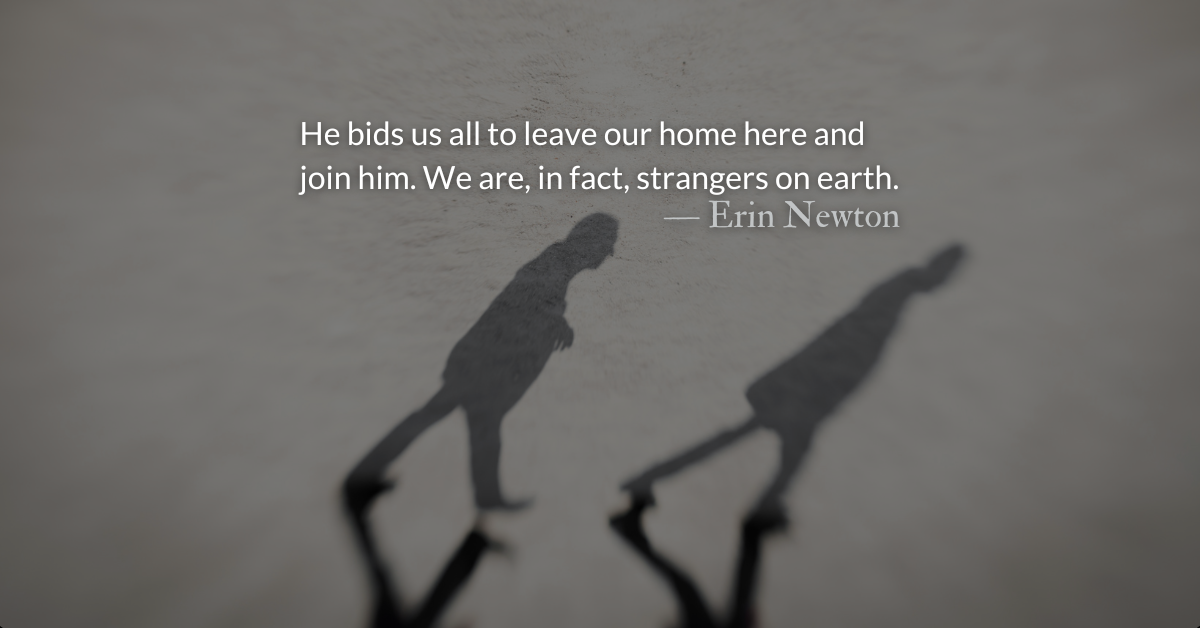Links for today’s readings:
Dec 10 Read: 2 Chronicles 10 Listen: (3:01) Read: Psalms 119.1-24 Listen: (15:14)
Scripture Focus: Psalm 119: 18-19
18 Open my eyes that I may see
wonderful things in your law.
19 I am a stranger on earth;
do not hide your commands from me.
Reflection: Peace in a World Not Our Home – Peace of Advent
By Erin Newton
“This world is not our own”—a phrase we have heard many times. It is an idea that ought to bring us peace. It should identify us as strangers on this earth. But we fall prey to the attempts of conforming to our world and its wishes, its desires, its motivations, its means.
But this world is not always kind, and motivations are often self-serving or abusive. The goals of one sometimes mean the subjugation of another. We cannot be at home here, not now, not as it is.
The prophets cried out in the wilderness against the same social injustices we have not found freedom from yet. We join the call: “Prepare the way for the Lord; make straight in the desert a highway for our God” (Isa 40:3).
And so one day, Christ left his home in the heavens to abide with us. Now, he bids us all to leave our home here and join him. We are, in fact, strangers on earth.
We are estranged from the impulses of society, the human-centered goals of a self-centered populace. For such reasons, we must see the beauty and wonder of God’s law. We must find peace in going a different direction than what the world says is “the way.” The Way tells us to find our peace in him.
Wendell Berry expresses the need for “the peace of simple things” in his poem “The Want of Peace”:
All goes back to the earth,
and so I do not desire
pride of excess power,
but men who have had little:
the fisherman’s silence
receiving the river’s grace
the gardener’s musing on rows.
I lack the peace of simple things.
I am never wholly in place.
I find no peace or grace.
We sell the world to buy fire,
our way lighted by burning men,
and that has bent my mind
and made me think of darkness
and wish for the dumb life of roots.
As we reflect on the peace of knowing we are truly strangers here—never exactly conforming, never assimilating to those around us—we find peace. The peace of Advent is rooting ourselves in who God calls us to be.
Let us find the peace of simple things. Let go of the ways of the world and embrace the beauty of God’s direction in your life. The peace of Advent calls us to our true home.
Divine Hours Prayer: A Reading
In due course John the Baptist appeared; he proclaimed this message in the desert of Judaea, ‘Repent, for the kingdom of Heaven is close at hand.’ This was the man spoken of by the prophet Isaiah when he said: A voice of one that cries in the desert, ‘Prepare a way for the Lord, make his paths straight.’ This man John wore a garment made of camel-hair with a leather loin-cloth round his waist, and his food was locusts and wild honey. Then Jerusalem and all Judaea and the whole Jordan district made their way to him, and as they were baptized by him in the river Jordan they confessed their sins. — Matthew 3.1-6
– From The Divine Hours: Prayers for Autumn and Wintertime by Phyllis Tickle.
Consider Supporting Our Work
If you appreciate our ad-free biblical content, please consider becoming a one-time or monthly donor.
Read more: People of Two Cities
The righteous, eternal city…is a city of people who trust God for their peace. It is a shelter for refugees escaping the wicked city.






